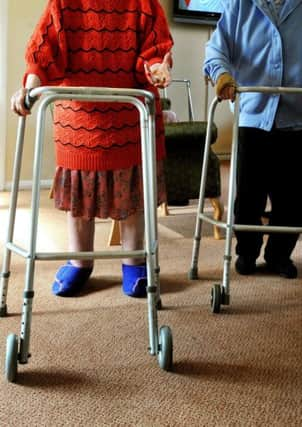Majority believe adult care system is ‘not fair’


One respondent claimed the current system was “totally degrading for our elderly relatives.” Another claimed: “It’s not fair...there will always be spongers who gain and grafters who pay...I hate the idea that rich families would shirk their responsibilities...I equally hate the idea that a poor person is neglected.”
Locally the Western Health and Social Care Trust (WHSCT) was the only North Western headquartered organisation to respond to the Department of Health, Social Services and Public Safety’s (DHSSPS) ‘Who Cares’ discussion document.
Advertisement
Hide AdAdvertisement
Hide AdDerry City Council, Limavady Borough Council and Strabane District Council either didn’t have any views or didn’t make them known. Neither did the DUP, Sinn Féin, SDLP, UUP, TUV, the Green Party and People Before Profit. To its credit the Alliance Party did respond.
In September 2012 Health Minister Edwin Poots asked people to have their say on the future of adult care and support.
“I urge everyone to read the consultation and join what I believe is a much needed debate. While care and support might not be something you are thinking about now, the likelihood is that one in three of us will have some form of care need after the age of 65.
“We simply can’t afford to bury our heads in the sand and this is your chance to influence change,” he said at the time.
Advertisement
Hide AdAdvertisement
Hide AdNow DHSSPS has published a consultation analysis report, which finds that 83 per cent of respondents agreed with the document’s vision of promoting the principles of “dignity and respect, quality, independence, equity, equality and diversity, human rights, safeguarding and sustainability and affordability.”
But some expressed concerns about the language underpinning this vision.
The Alzheimer’s Society argued: “The draft vision uses the word ‘should’ when describing good treatment and care, prevention of personalising individual need...’must’ would be more appropriate.”
The Northern Ireland Association for Mental Health (NIAMH) stated: “We recommend the avoidance of text or tone that is judgemental or stigmatising particularly around vulnerable groups who, by reason of their disability or discrimination have been reliant on welfare benefits during their adult life.”
Advertisement
Hide AdAdvertisement
Hide AdOthers expressed outright opposition to the document’s vision.
One respondent claimed the vision was “largely inappropriate and vague.”
“Treating people with dignity should be an obvious principle. It is entirely inappropriate to apply a public health mantra ‘to maintain our own well-being’ to very vulnerable groups, that is people with learning disability, people with physical disability and forms of mental illness or frailty, which are not within their control,” the unnamed respondent stated.
Another said: “The system in place now is totally degrading for our elderly relatives and nursing staff and doctors are totally removed from the impact this is having on the elderly and their relatives.”
Advertisement
Hide AdAdvertisement
Hide AdThe Department of Health says it will now proceed to stage two of the reform of adult care in Northern Ireland.
However, the officials who drafted the consultation analysis warn the process may take a while.
“It is anticipated that stage two of reform may take some time to allow for complex financial modelling.”
Over 600 people attended a series of public events or meetings to discuss the document and 185 responses to the consultation were received in varying formats.
Advertisement
Hide AdAdvertisement
Hide AdOne consultation event was held in Londonderry and was attended by 27 people. Another was held in Limavady and was attended by six people.
Two separate specific focus groups were also held in Londonderry and nine people attended on each occasion.